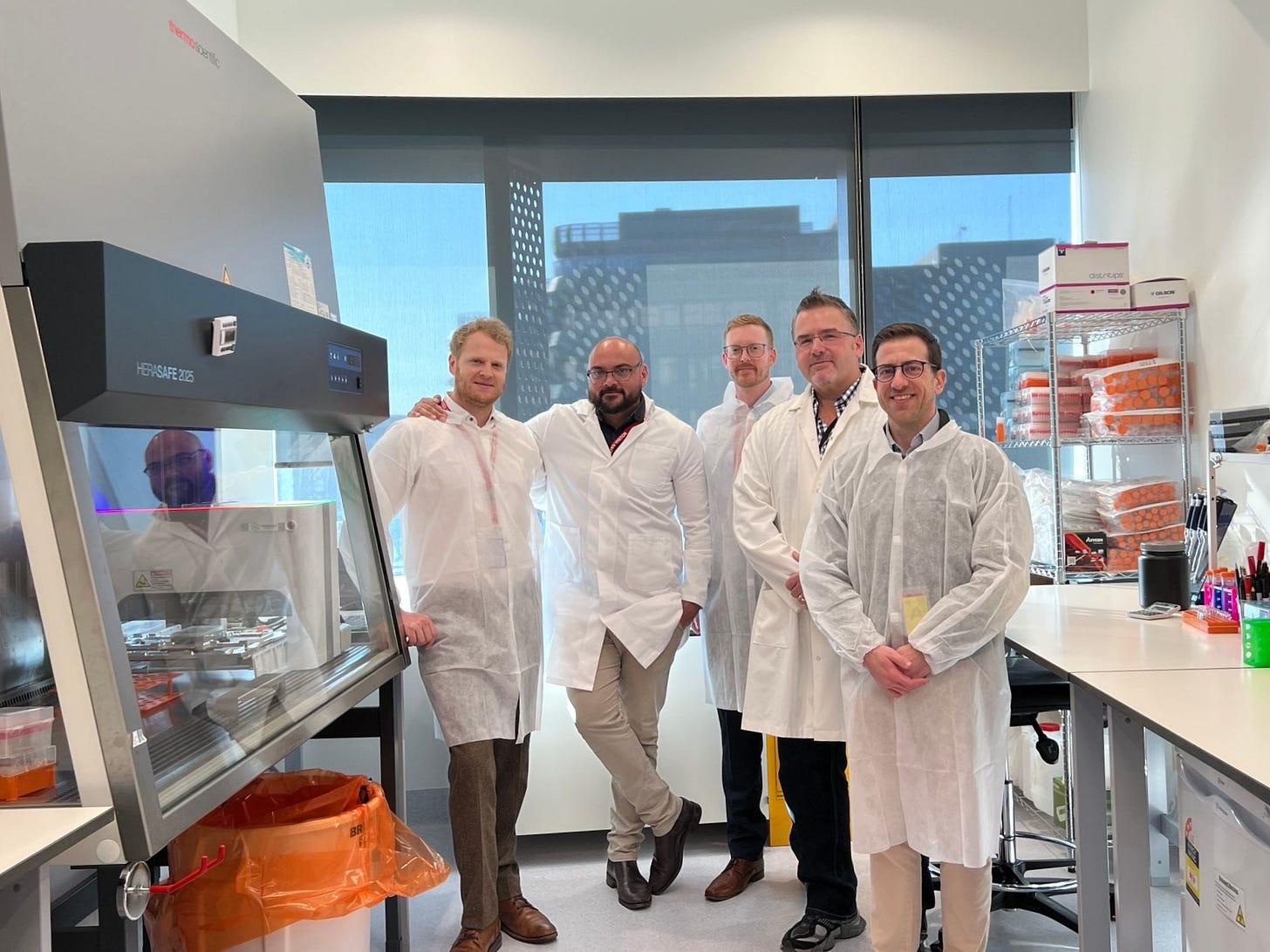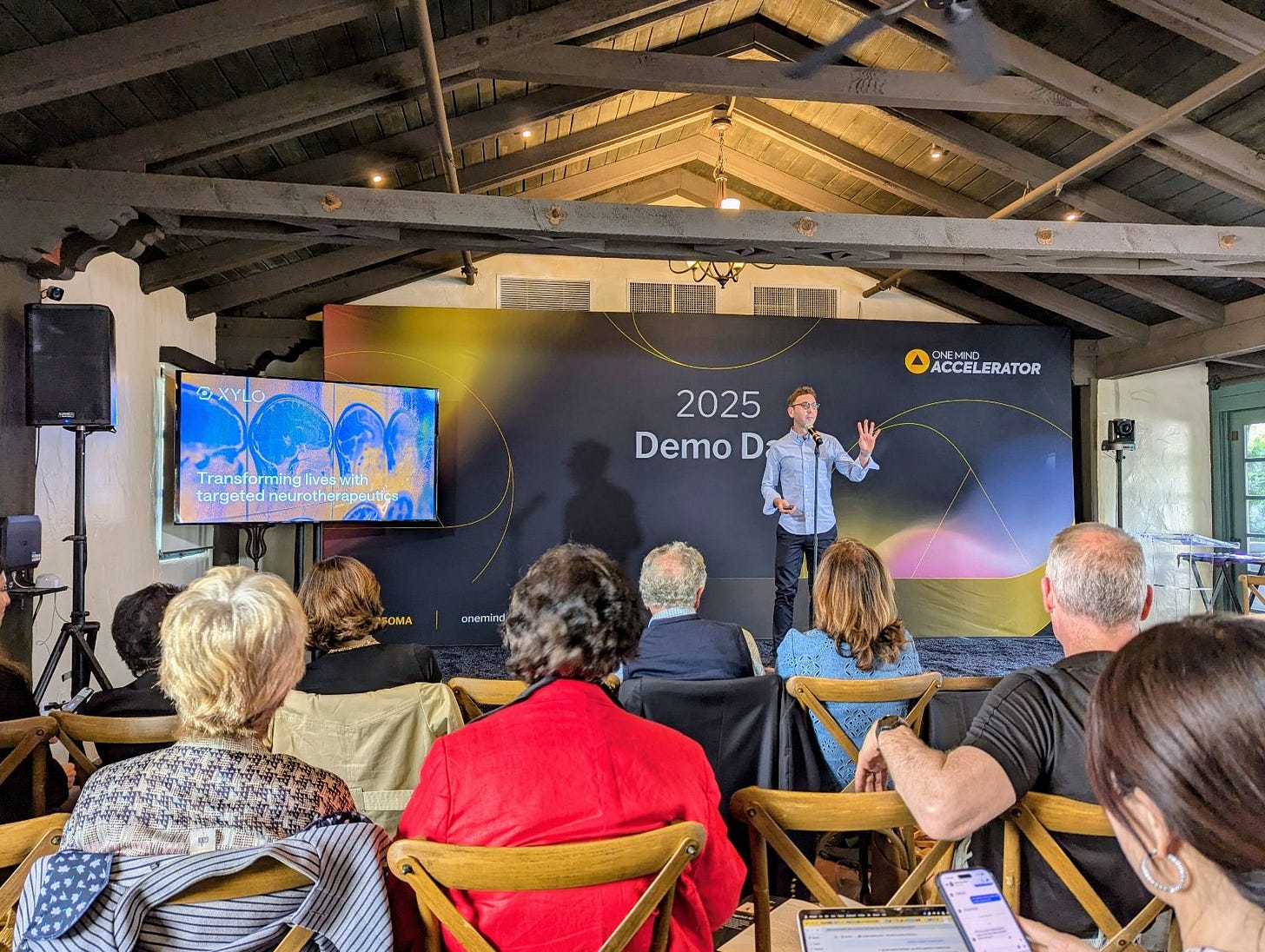Xylo Bio's Neuroscience Newsletter, May 2025
We unpack how psychiatry is rewriting the rules of clinical research - plus updates from Xylo Bio and the latest in psychedelic science
Welcome to the June edition of Xylo Bio’s Neuroscience Newsletter. This month, Science in Sixty Seconds explores how psychiatry is rethinking clinical trial designs toward smarter, more responsive models. You’ll also find highlights from recent studies in Research Updates and the latest company milestones in Xylo Bio Updates.
Science in Sixty Seconds
Rewriting the Rules: How Psychiatry Is Innovating Clinical Trials
Randomized controlled trials (RCTs) – where participants are randomly assigned to receive either an active treatment or a control (usually placebo) – have long been considered the gold standard for evaluating drug efficacy. But in psychiatry, where diagnoses are broad, outcomes are subjective, and treatment effects can be subtle, RCTs often fall short. These limitations are even more pronounced when investigating psychoactive compounds, which often produce noticeable effects that compromise blinding and introduce bias through expectancy.
In this month’s Targeted Neuro Talk, Professor Paul Glue explains how these challenges have shaped the landscape of psychiatric drug development. As he notes, many psychiatric treatments - like ketamine, benzodiazepines, even atypical antipsychotics - are inherently psychoactive, making it easy for participants to guess their treatment assignment. This “functional unblinding” fuels expectancy effects and distorts outcome measures, potentially exaggerating or masking therapeutic signals.
He highlights that increasing placebo responses, especially over the past two decades, are making it harder to detect true drug-placebo differences. One of the simplest (and most costly) workarounds has been to increase sample sizes. But as Professor Glue points out, this approach is rarely feasible in Phase 2 trials.
So how is the field adapting?
Across the field, a growing consensus supports smarter, more flexible trial designs that increase assay sensitivity and reflect biological precision. Among the most discussed innovations:
Enrichment designs pre-select participants likely to benefit or remain in the trial -based on early response, symptom profiles, or biomarkers. This increases assay sensitivity and reduces required sample sizes.
In a recent extended-release ketamine trial, published in Nature Medicine, Professor Glue’s team used an enrichment design in which only participants who responded during an open-label run-in phase (where all participants knowingly received the active drug) were randomized to continue treatment or switch to placebo. This helped reduce variability, improve signal detection, and lower the risk of trial failure.
Sequential Parallel Comparison Designs (SPCD) use a two-stage process: in stage one, participants are randomized to active drug or placebo; in stage two, only placebo non-responders are re-randomized. This helps isolate the true drug effect by minimizing placebo interference.
Platform trials test multiple treatments under a single protocol, often using shared control groups and adaptive features, including interim analyses to assess intervention performance and this data is used to add or drop treatment arms mid-trial. They offer greater efficiency and flexibility and are gaining traction in psychiatry.
Biomarker-guided approaches, while still evolving, aim to stratify patients by underlying pathophysiology rather than symptoms alone, mirroring progress in oncology and immunology. For example:
EEG-based predictors of placebo response
Inflammation markers (e.g., CRP or IL-6) have been used to identify subgroups more likely to benefit from anti-inflammatory treatments.
Reward circuitry activity (via fMRI) has been explored as a potential moderator of antidepressant response.
🎥 Watch our latest Targeted Neuro Talk with Professor Paul Glue
Xylo Bio Updates
Reconnected with the 2025 One Mind Accelerator cohort and attended the Stanford Drug Discovery Symposium in California, May 28–29, 2025.
We met with our CRC-P partners, Tessara Therapeutics and the Brain and Mind Centre, University of Sydney, in Melbourne to advance the $6.2M project on substance use disorders, May 15, 2025.
Dr. Sam Banister (CSO) presented preclinical findings on PSYLO-1001 at the 5th Annual Psychedelic Therapeutics & Drug Development Conference in San Diego, May 19-20, 2025.
Josh Ismin (CEO) featured on Startup 360 podcast discussing Xylo’s rebrand, US expansion, and founder insights, May 16, 2025.
The team attended Pathways to Progress: Enhancing Drug Discovery and Development in Melbourne, hosted by Jumar Bio and BioCurate, spotlighting biotech innovation and cross-sector collaboration, May 15, 2025.
Samantha Tabone (Director of Business Development) led the Investment Leaders panel at The Forum in Edmonton, hosted by Nucleate Canada, May 21, 2025.
Xylo Bio was highlighted on XEIA’s Human 3 podcast for pioneering non-hallucinogenic psychedelics with step-change potential, May 15, 2025.
Dr. Dilara Bahceci (Head of Communications) published a first-author paper in Drug and Alcohol Dependence on psychedelic experiences among methamphetamine users.
Coming up:
BIO International Convention (Boston, June 16–19) – Samantha Tabone will be in Boston around the meeting.
Psychedelic Science 2025 (Denver, June 16–20) – Dr. Sam Banister attending
Gordon Research Conference: Neurobiology of Psychedelics (Rhode Island, July 13–18) – Dr. Sam Banister, Dr. Lachlan Whish, and Dr. Dilara Bahceci attending
🤝Join the Team:
We are currently hiring for:
Vice President of Research and Development (San Francisco, CA, or Boulder, CO)
Chief Development Officer (San Francisco, CA, flexible)
Photos

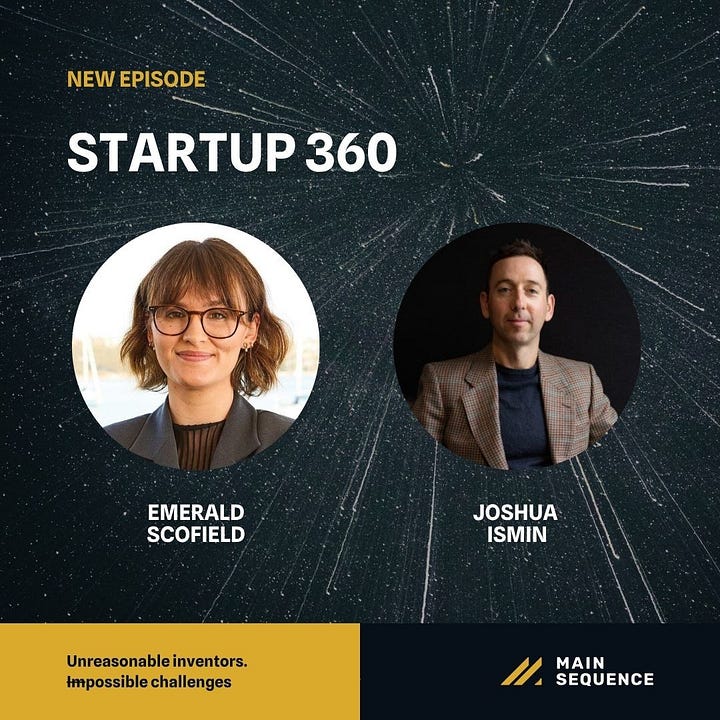
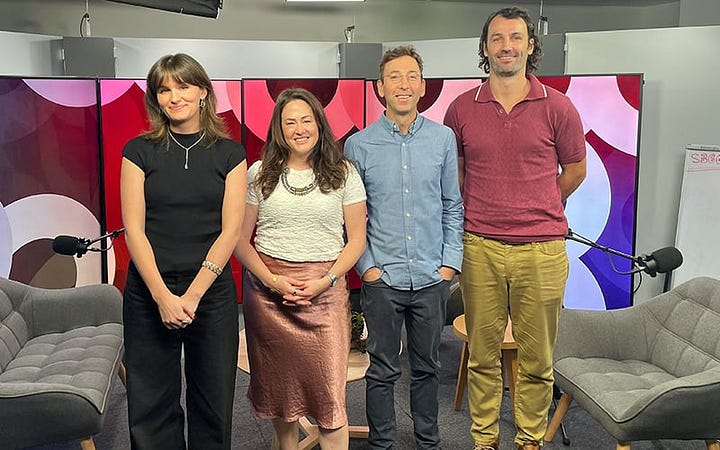
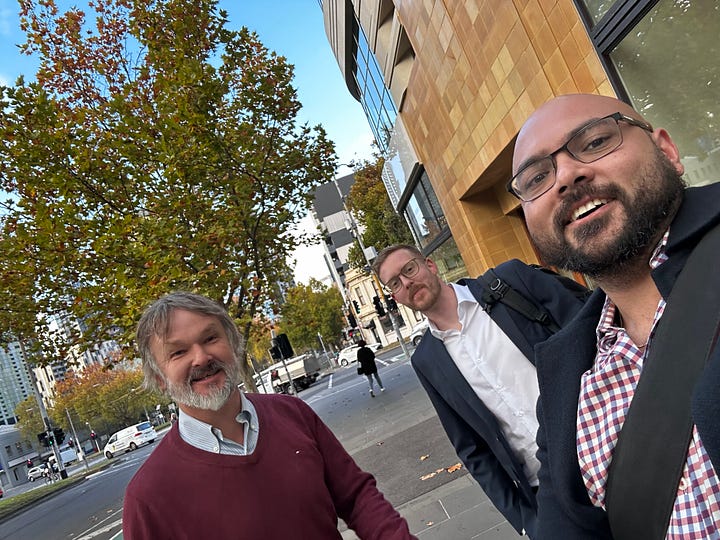

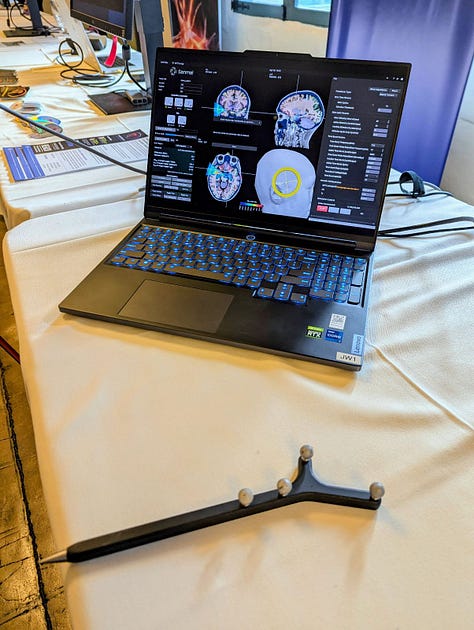
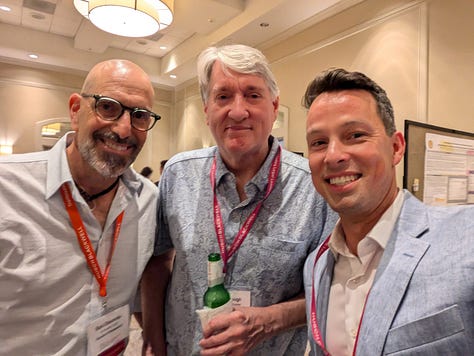
Research Updates
Clinical Research
Psilocybin vs escitalopram brain effects | Escitalopram reduced brain responsiveness to emotional stimuli, while psilocybin did not; both treatments improved depressive symptoms in a randomized controlled trial of 46 people with major depression. Am J Psychiatry
DMT for treatment-resistant depression | Vaporized DMT induced rapid and sustained antidepressant effects in treatment-resistant depression, with a 21-point MADRS reduction and high response and remission rates by day 7, with effects lasting up to 3 months in an open-label trial (N=14). Neuropsychopharmacology
DMT alters brain control energy and entropy | DMT significantly reduced fMRI global brain control energy, correlating with EEG signal diversity, subjective effects, and regional 5-HT2A receptor density (N=14). Commun Biol
Psychedelic experiences in methamphetamine users | Among people who regularly use methamphetamine, psychedelic use was linked to improved mood, social functioning, and reduced substance use in some individuals - particularly when experiences were less challenging and more planned - though overall outcomes were mixed; international survey (n = 268). Drug Alcohol Depend
Psychedelics and trauma response after attack | Individuals who used classic psychedelics during a terrorist attack reported lower anxiety and post-traumatic symptoms three weeks later than those who used MDMA or no psychedelics, found an observational study of 343 adults. J Psychopharmacol
Psilocybin use rising across the U.S. | Psilocybin use increased significantly from 2019 to 2023 across all age groups in the U.S., with particularly high prevalence among those with anxiety, depression, and chronic pain. This multisource observational study drew on national survey and registry data and found a parallel rise in poison center reports, underscoring the need for improved public health monitoring. Ann Intern Med
SES reporting in psychedelic trials | Most psychedelic-assisted therapy trials failed to report income or education, and U.S. trial participants were predominantly from higher socioeconomic backgrounds; a systematic review of 98 studies. Nat Ment Health
Preclinical Research
Non-hallucinogenic LSD-like compound shows promise | (+)-JRT, a novel LSD analogue, promoted neuroplasticity and improved behavior in mice without hallucinogenic or psychosis-like effects. Proc Natl Acad Sci U S A
Psilocybin reduces pain via serotonin receptors | Psilocybin and DOI dose-dependently reduced hypersensitivity in mouse models of neuropathic and inflammatory pain via 5-HT2A receptor activation. Pharmacol Res
Psilocybin has a narrow antidepressant dose range | Only the intermediate psilocybin dose (0.32 mg/kg) produced antidepressant-like, pro-social, and anti-anhedonic effects in rats, while higher doses caused adverse effects without mood benefits; BDNF levels increased linearly, independent of behavioural outcomes. Prog Neuropsychopharmacol Biol Psychiatry
Comparing effects of 5-HT2A partial agonists | Psilocybin, lisuride, and 25CN-NBOH produced distinct brain activity and receptor occupancy profiles in non-human primates. J Cereb Blood Flow Metab
Agmatine activates serotonin neurons via 5-HT2A | Agmatine increased serotonergic firing in the dorsal raphe and upregulated 5-HT2A and 5-HT1B receptors in rats, suggesting dual serotonergic modulation may underlie its antidepressant-like effects. Int J Mol Sci
Psilocybin alters neuropeptide gene expression | Psilocybin increased expression of several neuropeptides and serotonin receptors (5-HT1A, 5-HT2A, and 5-HT2B, but not 5-HT2C) in the rat hypothalamus, unlike ketamine. J Psychopharmacol
Psilocybin pharmacokinetics model in animals and humans | A physiologically based pharmacokinetic (PBPK) model accurately described psilocin distribution in mice, rats, and humans after psilocybin administration, predicting brain exposure to inform dosing and trial design. Sci Rep
Psilocybin alters brain activity in rats | Psilocybin dose-dependently increased global brain activity and connectivity in awake rats, especially in somatosensory, thalamic, and cerebellar regions; with sex differences in neural sensitivity. Front Neurosci
Sex differences in psychedelic effects in mice | Female C57BL/6J mice showed greater head twitch responses than males at high doses of DOI, LSD, and psilocybin, despite similar drug potencies across sexes. Psychopharmacology (Berl)
[Preprint] Psychedelics enhance flexible learning in mice | A single dose of the 5-HT2A-preferring psychedelic 25CN-NBOH improved reversal learning performance in mice weeks after administration, suggesting persistent cognitive flexibility enhancements. bioRxiv
[Preprint] Psilocybin’s behavioral effects in mice | A multi-institutional study found that psilocybin reliably induced acute anxiety-like behavior and reduced fear in mice but showed modest and inconsistent longer-term effects on depression, anxiety, and social behaviors across five labs and ~200 mice. bioRxiv
[Preprint] Automated detection of psychedelic-induced head twitches | An open-source tool accurately detected head twitch responses in mice using video analysis, validating its utility in assessing 5-HT2A activation and bufotenine’s effects. bioRxiv
Reviews and Editorials
Issues in clinical trial design – Lessons from the FDA’s rejection of MDMA | This viewpoint discusses the key methodological and regulatory concerns that contributed to the FDA’s rejection of MDMA for PTSD, offering insights to guide future trials of psychoactive therapies. JAMA Psychiatry
5-HT2A receptors: Pharmacology and functional selectivity | This review explores the structural pharmacology and functional selectivity of 5-HT2A receptors, highlighting their central role in both psychedelic drug action and therapeutic potential for psychiatric disorders. Pharmacol Rev
Efficacy and safety of psilocybin for the treatment of substance use disorders: A systematic review | This systematic review found preliminary evidence supporting psilocybin-assisted psychotherapy as a potentially effective and safe treatment for alcohol and tobacco use disorders, though larger trials are needed to confirm these findings. Neurosci Biobehav Rev
Less is more? Antidepressant effects of short-acting psychedelics | Emerging evidence supports that short-acting psychedelics like DMT may offer rapid and sustained antidepressant effects with fewer resource demands than longer-acting compounds like psilocybin but emphasizes the need for placebo-controlled trials to confirm efficacy. Neuropsychopharmacol
Psychedelics and eating disorders: Exploring the therapeutic potential for anorexia nervosa and beyond | This review explores emerging evidence supporting the potential of psychedelics like psilocybin and MDMA to treat anorexia nervosa by modulating neural circuits and enhancing emotional processing, while highlighting the need for further clinical validation. ACS Pharmacol Transl Sci
Are the LSD-analogs lisuride and ergotamine examples of non-hallucinogenic serotonin 5-HT2A receptor agonists? | This article challenges the widely held assumption that lisuride and ergotamine are non-hallucinogenic 5-HT2A agonists, urging caution in using them as templates for non-hallucinogenic psychedelic drug development and emphasizing the need for rigorous human data. J Psychopharmacol
Psilocybin and obsessive-compulsive disorder: Exploring new therapeutic horizons | This review explores the potential of psilocybin as a novel treatment for obsessive-compulsive disorder (OCD), highlighting early clinical evidence, neurobiological mechanisms, and future research directions to support its use in treatment-resistant cases. Neurosci Bull
New Clinical Trial Registrations
Psilocybin (3 mg) vs Placebo | Generalized Anxiety Disorder (N=50) | A Phase 2a, Placebo-Controlled Randomized, Double-Blind Trial to Evaluate the Safety, Tolerability, and Preliminary Efficacy of Psilocybin Oral Solution in Adults With Generalized Anxiety Disorder | Sponsor: Queen's University | NCT06969170
Psilocybin (25 mg vs 1 mg) + psychotherapy | Bipolar II Depression (N=90) | Psilocybin-Assisted Therapy for Treatment-Resistant Depression in Bipolar II Disorder: A Randomized Controlled Trial | Sponsor: Lakshmi N Yatham | NCT06943573
Psilocybin (25 mg) + psychotherapy | Chronic Pelvic Pain (N=15) | Psilocybin for Chronic Pelvic Pain (CPP) in Women: A Pilot Feasibility Study (Open Label) | Sponsor: Oregon Health and Science University | NCT06988319
MDMA (80 mg + 40 mg, then 120 mg + 60 mg) + psychotherapy | Post-traumatic Stress Disorder (N=20) | High-Intensity Inpatient MDMA-Assisted Psychotherapy for Treatment-Refractory Posttraumatic Stress Disorder: An Open-Label Pilot Study (Open Label) | Sponsor: ARQ National Psychotrauma Centre | NCT06954025
Jump back to:
Science in Sixty Seconds – How Psychiatry Is Innovating Clinical Trials
Research Updates – Summaries of recent studies shaping the field.
Xylo Bio Updates – Company news, progress, and highlights.









